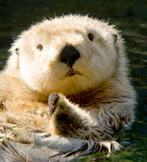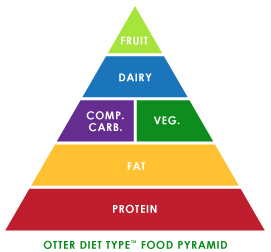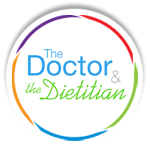50% PROTEIN / 25% FAT / 25% CARBS
 The Otter Diet is recommended when Diet Typing results reveal a fast oxidative rate and normal blood pH, or a balanced oxidative rate and acidic blood. It is designed to help balance blood sugar and maintain or raise blood pH into the normal range. The foods that help you accomplish this are protein and fat, not sugar or excessive fruit and carbohydrates. Thus, the Otter Diet leans toward the high protein/fat, low carbohydrate end of the Diet Type spectrum. It is very similar to what an otter would eat, and that’s how we came up with the name!
The Otter Diet is recommended when Diet Typing results reveal a fast oxidative rate and normal blood pH, or a balanced oxidative rate and acidic blood. It is designed to help balance blood sugar and maintain or raise blood pH into the normal range. The foods that help you accomplish this are protein and fat, not sugar or excessive fruit and carbohydrates. Thus, the Otter Diet leans toward the high protein/fat, low carbohydrate end of the Diet Type spectrum. It is very similar to what an otter would eat, and that’s how we came up with the name!
Start your day with a meaty breakfast, such as ham and eggs, as these foods are broken down slowly for longer-lasting energy and help to balance blood pH, longer than a breakfast of toast with jam. After breakfast, eat protein/fat meals and snacks regularly through the day (every 3-4 hours).
General Guidelines To Following The Otter Diet
Below is a pyramid that you can use as a guideline for which foods are most important in following the Otter Diet. Your meals should be primarily meat, accompanied by some fat, vegetables, and a very small amount of complex carbohydrates. A great example of an Otter meal is a pork chop with a side salad topped with an oil-based dressing, and a small side of buttered sweet potato. You have protein coming from the pork, vegetables coming from the salad, fat coming from the dressing and butter, and complex carbohydrates coming from the sweet potato. Notice there is no room for simple carbohydrates or sugars.
KEY POINTS
• Otters get maximum energy from protein and fat.
• Otters need to eat a large breakfast, then eat every 3-4 hours through the day, including a small evening snack.
• No simple carbohydrates are allowed daily, and no more than a single fruit serving.

10 Guidelines To Being An Otter
You just found out you were an Otter, either by coming into Caring Medical and having Diet Typing done, or by taking our online quiz. In both cases you may not have fully understood what it means to be an Otter! Here’s a list of the top 10 guidelines Otters should follow!
ALL OF YOUR MEALS SHOULD BE PROTEIN BASED
Not that you can’t have a snack or two that consist of nuts or veggies, but your main meals of the day should be largely protein, meaning meat, poultry, fish, eggs, or even tofu!
FAT IS NOT BAD
Don’t be scared of a food that has mostly fat calories. As an Otter you need a good amount of fat. So snack on nuts, add oil to your pan before cooking that chicken breast, and dip your carrot sticks in hummus. Top your salad with sliced avocado. This means you’re eating like an Otter.
MAKE YOUR CARBS COUNT
Because you are limited on the amount of carbs you can have each day, you should take in the most nutrient dense carbohydrates as possible. This means whole grains, high fiber choices, and most of all no processed grains like low carb bread.
KEEP YOUR ENERGY STABLE ALL DAY BY FUELING UP OFTEN
Don’t wait until you feel like you’re on empty before you grab something to eat. Otter’s tend to need frequent meals, so don’t be afraid to nibble a little here and there…as long as it’s on Otter foods! Otters typically need to eat every 4 hours, so plan on snacking.
TRY NOT TO RELY ON GRAB AND GO FOOD ALL DAY
We’re all busy and cooking takes time, so having something like a protein shake for breakfast is okay. Just don’t let that be the standard for all your meals. You’ll be missing out on some necessary nutrients. And if you are doing protein shakes, check your labels to make sure it’s a natural shake and doesn’t have a lot of carbs or sugar in it. Check out the Hauser Diet book for protein shake recipes for Otters that include protein and fats.
YOU ARE NOT ON A LOW FAT DIET
So there’s no need to have a cabinet full of low fat and fat free labeled foods. So when it comes to peanut butter and salad dressings…go full fat. Besides, when they take the fat out of these products, often times they add sugar, which Otters should avoid.
GO NATURAL!
The Hauser Diet focuses on eating natural foods that have not been processed. If you are a convenience food person, you may find that eliminating all the food chemicals and toxins that are put in those packaged items gives your health a great boost.
YOUR VEGETABLES SHOULD PROVIDE YOU WITH SOME BENEFIT
Having your daily supply of vegetables be cucumbers and celery won’t cut it. Not that these items are bad for you, but they won’t provide you with as much fiber, vitamins, and minerals as veggies such as broccoli, beets, and spinach.
SUGAR IS THE ENEMY FOR OTTERS
Whether it’s plain sugar or sugar foods and drinks, they will deplete your energy, hurt your immune system, and promote quick weight gain!
FRUIT IS NOT AN UNLIMITED FOOD
Having a piece a day is fine, but more than that and your sugar intake will be too high. This includes fruit juice!
Take these ten tips of the trade and put them into practice. They will help you get the most out of your Hauser Otter Diet.
How to Make Your Otter Diet More Energy Efficient
Ok, so there’s an enormous waiting list for fuel efficient cars, the light bulb has been re-invented to be more energy efficient, but what have you done for your diet to maximize the energy output from the fuel you give it? We are not just talking about eating less, but making sure what you eat is actually giving you energy. Remember, food is the fuel for our bodies, and we want to put in the right fuel to give us the most amount of energy. “To have more energy” is the number one goal of most patients we see here for the Hauser Diet program. For various reasons, their energy just seems depleted. It is an effort to make it through the day, and no matter how “healthy” they feel they eat, they feel tired.
Let’s review the basics of “energy efficiency” on the Otter Diet:
EAT BREAKFAST
Otters typically have a low fasting blood sugar—which means after sleeping, they need to eat something to jumpstart their metabolism. Eat a big breakfast—it will help you take on the day with more gusto.
CUT OUT THE CAFFEINE
Are you on the Otter Diet, yet reaching for coffee and other “quick fix” remedies to give you a boost? Caffeine will only acidify your blood further, depleting more energy. Also, it will worsen blood sugar swings. So, you may enjoy the boost it brings in the beginning, with an hour or two, you will likely be in the same place you were earlier: feeling like you need a nap or another cup of coffee! Stop the vicious cycle—coffee is not the way for an Otter to get good energy.
EAT PLENTY OF PROTEIN THROUGHOUT THE DAY
When we see foods like cereal, popcorn, and raisin toast on a food diary throughout the day, and only one main meat-based meal, the Otter Diet is not being represented. A true Otter meal plan will have meat for breakfast, lunch, dinner, and even snacks. Yes, it is truly a lot of meat—that is what someone with an Otter physiology needs, not waffles and corn. Protein should be the majority of all meals, plain and simple.
DON’T SKIP VEGETABLES, JUST BECAUSE YOU ARE A CARNIVORE
Vegetables are where an Otter is getting a significant amount of carbohydrates in their diet. This food group provides necessary fiber for healthy bowels, along with vitamins, minerals, and antioxidants that your body needs to stay on the ball. Think of your vegetables in a variety of color- red, orange, green, yellow. One of our favorites is simply skewering bell peppers and squash, brush with olive oil and rosemary, and grill. Serve with a big piece of grilled meat. Dinner in the summer can’t get simpler, and you’ll feel great!
SAY GOODBYE TO SIMPLE CARBS
For Otters, this includes fruit. Sorry, this is the wrong fuel for your engine! Opt for vegetables instead of fruit, or limit fruit to one per day. The effects of fruits and vegetables in your diet are not the same, and we do not put them in the same category. Fruit has too much sugar for you Otters. In addition to fruit, dropping the “energy” bars and snacks that contain a lot of white flour and sugar need to be dropped. Opting for a piece of natural beef jerky or a hard boiled egg as a snack will be a better choice for an Otter.
What Otter Foods Should I Get While Shopping?
A lot of patients have a hard time picking out the “right” foods at the grocery store. To a certain extent the definition of what the right foods are can change person to person, or more so Diet Type to Diet Type. One thing to avoid is buying anything that has any of the following labels on it: Low Fat, Fat Free, Reduced Fat, Low Sodium, Low Sugar, and Sugar Free. Of course as Otters you need to be buying foods that don’t have a lot of sugar anyways, but that means naturally low in sugar, not a modified product.
As for the fat there are there a couple of reasons why you should avoid those products. First, as an Otter you can have the fat. A large portion of your daily calories are suppose to come from fat, that doesn’t mean you want to over do it, but you don’t want to under cut it either. You can liberally use olive oil for fresh, homemade salad dressings. Some butter on your vegetables is just a-okay!
The second reason to avoid any foods with these labels is that they are most likely highly processed. Buying organic, natural foods would be preferred do to the chemical processing that is involved in non-organic foods. However, if you are not eating organic for one reason or another then try to stay with foods that are in their most natural state. When foods have a “low fat” or “sugar free” version, they have been even further processed. The producers of the food have taken something out, which also means that they have put something in. The added components of these foods tend to be artificial colors, artificial flavors, artificial sweeteners, or even modified fats. In short they are adding food chemicals. When you’re trying to be healthy, chemicals are not what you should be putting in your body!
What Should Otter’s Eat When Dining Out?
It’s Friday night and you don’t feel like cooking – let’s go out! You may be thinking, “I’ll just cheat this one time,” Right? Wrong! You can still eat out while following your Hauser Otter Diet. Just remember, you’re an Otter, so go for the meat and veggies!
Italian
The meat and veggie selections at Italian restaurants are delicious! Give them a try!
| 1. | Choose meat and veggie-based meals such as Chicken Cacciatore, Veal Marsala, or Beef marinated in wine sauce. |
| 2. | Choose interesting vegetable dishes like eggplant, asparagus, or broccoli made Italian style! |
| 3. | Nix the pasta and bread! Have a salad as a substitute – greens or even Caprese salad – one of our favorites – slices of fresh tomatoes and mozzarella drizzled with olive oil and fresh basil. |
| 4. | Pass on the red wine, and choose water instead. |
| 5. | Desserts are a no-no: Custards such as panna cotta (which is basically cooked cream) is a better Otter option than tiramisu or cannoli. |
Sample Italian Otter Meal: Chicken Vesuvio with mushrooms and asparagus or Veal Piccata and a fresh green salad.
Asian
Whether Thai, Chinese, or Japanese food – this category is always a favorite!
| 1. | Choose meat and veggie-based meals such as Beef and Broccoli, Chicken and Vegetable stir fry, Mongolian beef, Chicken Curry, or similar dishes. |
| 2. | Try seared fresh sashimi or spare ribs as an appetizer. |
| 3. | Avoid rice and noodle dishes and sides. Say no to chop suey and pad thai type dishes! These are not Otter-friendly! |
| 4. | Choose one of the many refreshing herbal teas (hot or cold). No sake for Otters! |
| 5. | Read your fortune, but don’t eat the fortune cookies! Or the almond cookies! |
Sample Asian Lion Meal: Kung Pao Chicken, stir fried vegetables, with Hibiscus iced tea.
Mexican
Mexican can be such a fun treat! Who doesn’t love Mexican food? YUM!
| 1. | Choose meat and veggie-based meals such as Chicken with Mole sauce, Carne Asada, or sea bass, or choose sizzling fajitas, minus the tortillas – chicken, beef, or shrimp – either way, they’re a great source of protein and veggies! |
| 2. | Put down the chips and nobody gets hurt! Sorry Otters, taco chips are a no-no for you. Ask for marinated veggies or guacamole instead. |
| 3. | Think outside the wrap: Otters should avoid high carbohydrate foods such as taco shells and rice. So say no tacos, burritos, and quesadillas. |
| 4. | Try a big taco salad topped with meat, cheese, guacamole, and sour cream. Just don’t eat the taco bowl! |
| 5. | Skip the margaritas and go for iced tea or water with lime. Otters will crash with sugar-laden drink mixes and alcohol! |
Sample Mexican Otter Meal: Beef fajita with grilled onions and peppers, pico de gallo sauce, sour cream, and guacamole.
American
There’s plenty of meat on the American menu!
| 1. | Choose meat-based meals such as steak, chicken, pork, or fish. |
| 2. | Want a burger? Go for it, but forget the bun and top with bacon, avocado, and tomato. |
| 3. | Love sandwiches? Try wrapping fresh sandwich meats in lettuce to give you something to hold. No bread for you! |
| 4. | Nix the fries, chips, onion rings, and bread baskets. Try salad, baked beans, or veggie based sides. Tell the waiter “no bread” or you’ll be too tempted. |
| 5. | Love that brew? Sorry Otters! Beer is not an Otter-friendly beverage, even the “low-carb choices.” Otters need to stick to water or unsweetened iced tea. |
Sample American Otter Meal: Pork loin with sautéed vegetables, and a half baked sweet potato with butter.
What Foods Should Otters Avoid?
Otters must consume diets high in protein and fat! Otters are typically fast oxidizers of food with typically acidic blood ph levels. In order to normalize your blood sugar levels, you should consume foods that are metabolized more slowly, such as fats and proteins. In order to help bring your blood pH levels into the normal range, you really need to make sure to consume fats and proteins, not carbohydrates. You can have a small amount of carbohydrates – but yours should be complex carbohydrates, consisting primarily of vegetables.
Are you thinking, “hum…I knew I liked this diet…I can eat a 12 ounce Ribeye, fried catfish, French fries, and any protein bar I can lay my hand on…”
Nope! That’s where you are wrong!
Allowing primarily protein and fats in your Hauser Diet does not make it completely acceptable to consume any kind of protein and fat. Let’s clarify this a little…
| 1. | Protein foods that contain chemicals, additives, dyes: this means avoiding those lunch meats, deli meats (unless fresh), hotdogs, bacon, sausages, and the like. |
| 2. | Trans-fats: you’ve heard it all over the news by now – fats heated to high temperatures denatures the fat, making them unsafe. Avoid products like margarine, hydrogenated oils, and fried foods. |
| 3. | Vegetables like corn and iceberg lettuce: These are nutrient poor, lacking in fiber, and poor vegetable choices. Think color! Choose nutrient dense, dark leafy greens, purple vegetables such as eggplant, and vitamin rich tomatoes, squash and the like. |
| 4. | Hormone injected chicken: Chicken is not chicken is not chicken. After working with a renown chef on the photography for the Hauser Diet book, we learned a lot about chicken. Regular grocery store chicken is injected with hormones, fillers, fluids, and chemicals. Purchase organic or Amish chicken if at all possible. |
| 5. | Fake Foods: The Hauser Diet Team hates fake foods. Avoid foods that claim to be high protein, low carb! Choose real food! If you’d like some help figuring out what to eat – give Caring Medical a call! |
What Is The Difference Between An Otter And A Lion?
The Lion Diet Type is high in protein and good fats/oils. The Otter Diet Type is also high in protein and fat, but is allowed a higher amount of carbohydrates and vegetables than the Lion Diet Type.
Lion Diet Types need to have 60% protein, 25% fats and oils, and 15% carbohydrates. The Otter Diet Types need to have 50% protein, 25% fats and oils, and 25% carbohydrates. As you can see these diet are different in their daily protein and carbohydrate amounts, but are both considered to be high protein diets.
Can I Drink Coffee & Caffeinated Beverages On The Otter Diet?
CAN I DRINK COFFEE?
Is coffee part of your morning ritual? Is it the caffeine or the comfort factor? Otters may not be too happy about this, but Otters need to eliminate coffee from their diets! We know, we know. This is a tough one! For many Otters, caffeine is not going to help you get through your day as much as you might think it does. It will actually cause you to crash and burn. Now you don’t want that, do you?
Your Diet Typing test results show that sugar is not the best thing for you. Caffeine can affect the blood in the same manner that carbohydrates/sugar does – it acidifies the blood and aggravates hypoglycemic symptoms. You are someone who can feel fatigued from caffeine because of its effect on blood pH and blood sugar levels.
IS ALL COFFEE CREATED EQUAL?
Nope! Of course, we feel that the best coffee to purchase is coffee that has been organically grown, without pesticides and chemicals. But since you Otters are not drinking it, that is kind of a moot point – unless you are serving it to your Monkey friends!
DECAF COFFEE?
Well, what about Decaf? Nope! We don’t recommend it. Most decaf coffee is even more laden with chemicals that have even been linked to autoimmune disorders. If you do drink decaf coffee, we recommend you drink Swiss Water decaf. You can read more about this issue in the Hauser Diet book. However, for Otters, it is best just to eliminate it from your diet.
WHAT ABOUT CAFFEINATED SODAS AND TEAS?
Our opinion on drinking sodas and sugared teas is that they just provide extra unneeded calories. Most of us do not need that! Otters, as we discussed above, do not tolerate sugar well, and consequently should not consume sugary sodas or teas.
CAN’T I JUST DRINK “DIET” SODA?
Nope! Again, if you are trying to eat as healthy as you can and put into your body what it can use best for energy, diet drinks are not included! Although this is a controversial opinion, we feel that artificial sweeteners should not be consumed on a regular basis. You can read more about this in Chapter 8 of the Hauser Diet book called “Shop Smart”.
As with any food or beverage, don’t overdo it. If you are addicted to coffee, you drink too much of it. If you must have a Diet Coke in the afternoon, you’re addicted to it.
WHAT ABOUT SPORTS DRINKS?
Are you an avid exerciser or athlete? Or do you just occasionally go to the gym or take a walk around the block? If you are relying on sports drinks, such as Gatorade and PowerAde to replenish you during and after workouts, you might be counteracting the good you’re doing by working out. Sports drinks do replenish much needed electrolytes that can be lost during an intense workout, intense being the key word here. But the main ingredient in these drinks is sugar. Just 8 ounces of a typical sports drink contains 14 grams of sugar. Otters need to avoid sugar because you do not feel your best drinking it. If you are just barely breaking a sweat, you really do not need a sports drink. Stick to plain water. For the endurance athlete who needs some replenishment, dilute your sports drinks ½ and ½ with water. Or better yet, take some electrolyte tablets with water and get your calories from proteins and fats such as nuts, meat, eggs, protein bars and the like.
IS JUICE OKAY FOR OTTERS?
Fruit juice is basically sugar – even though it is more natural. If you are looking to lose a few pounds, drinking a large volume of fruit juice every day can really pack on the pounds. Vegetable juices are lower in calories and are allowed on the Otter Diet, but we still recommend that you eat more fresh vegetables vs. juice. Again, sugar will acidify the blood pH and worsen symptoms of low blood sugar typically experienced by the Otter Diet Type.
WHAT IS YOUR BEVERAGE OF CHOICE?
We recommend good ol’ H-2-O! This is the best beverage for all Diet Types, guaranteed not to adversely affect you! Add a little lemon or lime and you’ve got a deliciously refreshing drink. Try a little sparkling water such as Pellegrino for something a little special!
Can Otters Eat Bread?
The Hauser Otter Diet is a modified high protein and fat, low carb diet. Many of you who have come to Caring Medical for Diet Typing test out to be Otters. This means that you have a tendency toward an acidic blood pH and are a fast oxidizer of food, especially carbohydrates.
So how is the Otter supposed eat?
The Otters should fill up their plates with protein-containing foods and vegetables, with very few other carbohydrates. We are talking about meat here, people! This means that you need to include beef, chicken, turkey, fish, eggs, pork, or lamb at every meal! Most people’s diets are completely devoid of vegetables. When we say vegetables, we mean that you should include foods such as asparagus, broccoli, eggplant, green beans, peas, carrots, cauliflower, Brussels sprouts, tomatoes, or dark leafy greens at your lunches and dinners. Carbohydrates, particularly simple carbohydrates like white bread, pasta, and rice, make the blood pH more acidic. They are also metabolized the most quickly of all the macronutrients, therefore making the Otters’ fast oxidative rates worse.
So what? If an Otter eats the wrong foods, he/she may experience things like:
• weight gain or inability to lose weight
• mental fog
• fatigue
• malaise
• concentration problems
• lack of energy
• joint pain
• low libido
• eventual elevated lipids and blood sugar levels
• high blood pressure
These are the issues that many of our patients come to Caring Medical with! Could there be a connection? You bet there is! If you feed the body the wrong fuel, it will not function optimally, and consequently will start to break down – often producing some of the symptoms mentioned above.
So what about bread? What about cereal?
In counseling patients on the Otter Diet, we find that these are two of most commonly asked questions! Why? Because in our experience, Otters are carb-junkies! After a nice Otter dinner, many an-Otter has been known to pour a bowl of cereal at night before bed time.
I recently attended a BBQ where six of the people attending the party were Hauser Otters, including the hosts. The Otters who were following the Otter Diet (and looked great, by the way), put meat and veggies on their plates. Those who were still struggling went for the potato chips, buns, and desserts! And what did I see when I opened up the hosts’ freezer to get some ice? You got it – CARBS!
Their kitchen was loaded with these foods that are bad for Otters:
• sugar free fudgsicles
• low carb coffee cake
• low carb bagels
• low carb candies
• canned fruit
• cereal
• white bread
• sugar-free coffee creamer
• 4 kinds of Diet sodas, to name a few things!
Otters, put down the breads and cereals and nobody gets hurt! It’s as simple as this, carbs, and even “pseudo carbs” like those mentioned above, are not healthy food choices for the Otter. Carbs are carbs! Otters need, and we mean need, protein and vegetables. These are the nutrients that best feed the Otter physiology. Put in the right fuel, get the best results.
Otters who drop the carbs and pick up the protein and vegetables come in telling us things like –
“Wow, I have not had this much energy since I was 22 years old!”
“Amazing, I started religiously following the Otter Diet, and my pain is 50% gone without doing anything else.”
“I know my husband is happy, I now have a sex drive that I thought was gone due to the aging factor!”
“Thank you – I have never felt better!”



